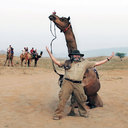0 Likes
The 2010 Meager Creek slide is the largest recorded slide to date in Canada's history and one of the largest slides world-wide since 1945. In the early morning of August 6, 2010, a large rock fall off the secondary peak of Mt. Meager onto the heavily saturated south side resulted in a massive slide of rock and debris to barrel down Capricorn Creek and into Meager Creek and the Lillooet River valley below. Meager Creek was completely filled with debris. The slide was so enormous that it filled the creek and ran more than 270 metres up the opposing valley wall. Gravity pulled the slide back down to the valley floor, carrying a wall of debris both upstream and downstream almost 13km from where the slide originated. The wall of debris destroyed approximately 6km of resource roads and two major bridges, both of which provided the only access to the popular Meager Creek Hot Springs.
The slide blocked Meager Creek, and partially blocked the Lillooet River, for approximately 19 hours. Subsequently, the Lillooet River saw a 10-15 metre rise in water level, and Meager Creek flooded the valley behind the wall of debris; 2.9 million cubic metres of trapped water created a lake several kilometres long. Due to fears the debris dam could fail and result in the sudden release of the backed-up water, approximately 1,500 residents downstream of the slide in the Pemberton Valley were immediately evacuated. Luckily, the natural gradual release of the pooled water lessened the fears of flooding and residents were able to return home.
Although there were recreationists and industry workers in the area, there were no injuries or fatalities. The number of people in the area at the time of the slide was drastically less than usual thanks to data received via a weather station that was installed by the Ministry of Forests, Lands and Natural Resource Operations earlier that year. That data gathered from the station prior to the slide indicated a safety risk and promptly the ministry to shut down access to the valley, ultimately saving numerous lives.
Although the Meager Creek valley was closed by the ministry, several pumice mine employees working in the Upper Lillooet valley became trapped behind the debris flow which crossed the Upper Lillooet Forest Service Road severing their only access out of the area. They were eventually rescued without incident. Prior to the closure, a few campers set up at the Upper Lillooet Campsite and were there when the slide started. By driving up a side road and out of harm's way they narrowly escaped behind caught in the slide. They too were rescued unharmed. The debris flow caused damage to areas frequented by wildlife and to spawning grounds for salmon. After the slide, the B.C. Forest Service and Fisheries and Oceans Canada worked cooperatively to ensure the affected spawning grounds were protected. The slide's direct impact and cost is estimated to have been approximately $10 million. The damage caused from the 2010 Meager Creek slide and changes to the surrounding landscape will remain visible and serve as a reminder of nature's power for many decades to come.
Source: Meager Creek landslide info sign
...





The capital of Canada is Ottawa, in the province of Ontario. There are offically ten provinces and three territories in Canada, which is the second largest country in the world in terms of land area.While politically and legally an independant nation, the titular head of state for Canada is still Queen Elizabeth.On the east end of Canada, you have Montreal as the bastion of activity. Montreal is famous for two things, VICE magazine and the Montreal Jazz Festival. One is the bible of hipster life (disposable, of course) and the other is a world-famous event that draws more than two million people every summer. Quebec is a French speaking province that has almost seceded from Canada on several occasions, by the way..When you think of Canada, you think of . . . snow, right?But not on the West Coast. In Vancouver, it rains. And you'll find more of the population speaking Mandarin than French (but also Punjabi, Tagalog, Korean, Farsi, German, and much more).Like the other big cities in Canada, Vancouver is vividly multicultural and Vancouverites are very, very serious about their coffee.Your standard Vancouverite can be found attired head-to-toe in Lululemon gear, mainlining Cafe Artigiano Americanos (spot the irony for ten points).But here's a Vancouver secret only the coolest kids know: the best sandwiches in the city aren't found downtown. Actually, they're hidden in Edgemont Village at the foot of Grouse Mountain on the North Shore."It's actually worth coming to Canada for these sandwiches alone." -- Michelle Superle, VancouverText by Steve Smith.